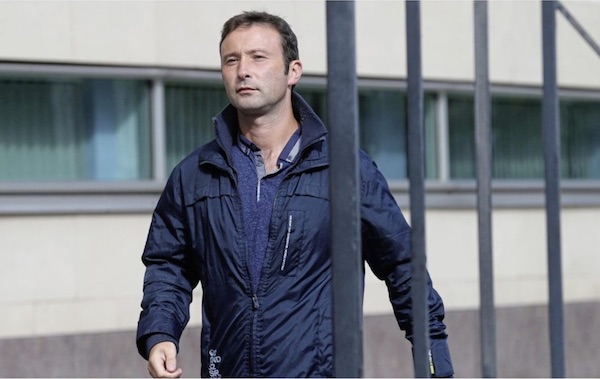
A judge in the non-jury trial of a prominent republican has admitted the prosecution was based entirely on allegations extracted by police threats and ordered him to be released, more than five and a half years after he was initially charged.
Damian ‘DD’ McLaughlin was accused of moving a car which Gardai police said was later used in an attack in which Maghaberry prison warder, David Black, was killed outside Belfast.
The prosecution case against Mr McLaughlin rested solely on the evidence of a Leitrim man, Stephen Brady, who was interrogated in a coercive manner by gardai, according to the judge at Belfast Crown Court.
The Diplock (non-jury) judge, Justice Adrian Colton, said that Gardai in Dublin were guilty of ‘aggressive, oppressive, hectoring and bullying’ when forcing Mr Brady to falsely identify Mr McLaughlin.
Recordings of the interviews, seen by the judge, were laced with illegal attempts to extract false allegations. The judge said the interviews were conducted in such a way as to “undermine the right to silence”. He concluded that as the case was solely dependent on tainted evidence, “no court could convict” Mr McLaughlin.
In an effort at damage limitation, prosecutors asked for a further 48 hours to consider an appeal before formally abandoning the case on Thursday.
A statement from Mr McLaughlin’s lawyer, Peter Corrigan, said that he had always vehemently denied the charges.
“The evidence obtained by the Gardai was significantly and fundamentally flawed from the outset, and should never have been relied upon, nor should Mr McLaughlin have been charged with these offences,” he said.
He added: “The techniques used by the gardai in extracting the information from the suspect can only be described as oppressive and inhuman. We plan to immediately proceed to make a complaint to the Garda Ombudsman for allowing such practices to occur. If the gardai abided by their own practice, our client would never have been before the courts.”
The saga of his prosecution saw Mr McLaughlin being returned to jail in 2012 after a previous incarceration, before he was bailed on draconian conditions. Rearrested in Donegal after violating his bail conditions, he was then extradited back North, despite a Dublin Court hearing that the Maghaberry regime would violate his rights as laid out in the European Convention on Human Rights. Remanded at the jail, he was subjected to two strip searches a day by the prison’s riot squad.
Dee Fennell of Saoradh said the case should have far-reaching consequences. “What has been exposed in the course of this case is the corrupt nature of pursued prosecutions against Republicans,” he said.
“What is now apparent, ironically confirmed by a British Diplock Judge of all people, is that DD McLaughlin was in jail because of a corrupt Garda culture that acts unchecked and with no balances.
“It is totally unaccountable, supported by draconian legislation and courts that have also been similarly deemed by organisations including the United Nations and Amnesty International to be incompatible with international law practices that commit to ensuring a fair trial.”
“This corruption is not only enabled by the Leinster House establishment, it is encouraged by the political descendants of the Broy Harriers and Blueshirts.”
The case has added to pressure for the abolition of the Special Criminal Courts. On Wednesday night, a packed public meeting, in the Teachers Club in Dublin, heard strong calls to abolish the courts, a campaign that is being supported by a range of councillors, TDs, community activists and trade unionists.
Mr Fennell said that scores of republicans “of various affiliations and none” had been wrongly incarcerated by the courts and hit out at their claim to prevent jury intimidation.
“Consistent reports, including from aforementioned human rights organisations, can find no evidence of jury intimidation prior to the SCC being initiated,” he said.
“When the SCC hears evidence, as in the case of an ongoing trial involving male and female Republicans from Belfast and Dublin, even when the sitting judges rule that evidence was gathered illegally, they paradoxically rule this evidence admissible.
“‘Belief’ evidence is permitted, with a Garda above a certain rank allowed identify someone they believe to be in the IRA. This evidence is admissible and has been ruled as such even when the Garda has admitted they had no knowledge of the defendant until after their arrest. This alone is deemed enough evidence by the State to pass the prosecutorial threshold.
“And of course, all this occurs after an arrested individual has their right to silence when under questioning removed, with this also adjudged by the 26 County administration to be supposed evidence of guilt.”
Mr Fennell warned there had been a “not too subtle” invitation from Justice Colton to the 26 County administration to seek Mr McLaughlin’s reverse extradition, because the Special Criminal Court in Dublin would view the “evidence” more favourably.
“It should encourage human rights organisations, many of whom are quick to highlight the repressive State apparatus being utilised by other regimes, to initiate reports on the use of draconian legislation to target political activists here at home. They should no longer be allowed to continue their dereliction of duty in this regard.”
![[Irish Republican News]](https://republican-news.org/graphics/title_gifs/rn.gif)
![[Irish Republican News]](https://republican-news.org/graphics/title_gifs/harp.gif)

